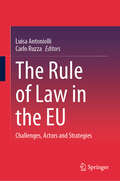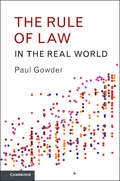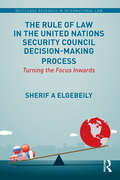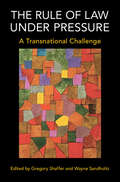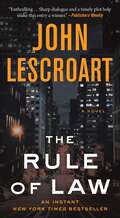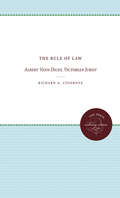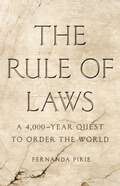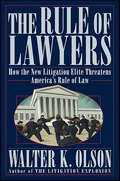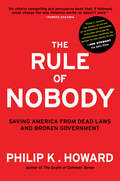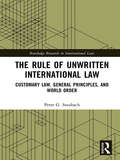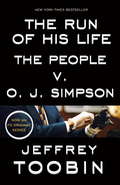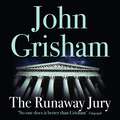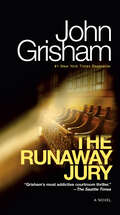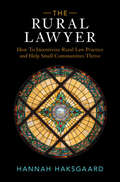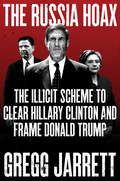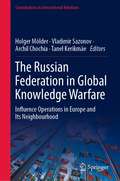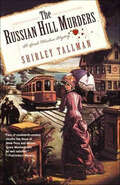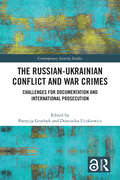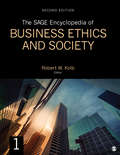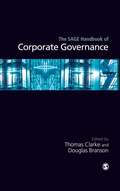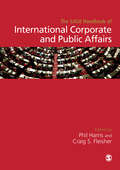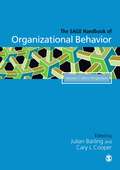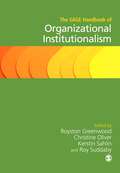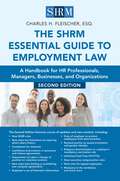- Table View
- List View
The Rule of Law in the EU: Challenges, Actors and Strategies
by Carlo Ruzza Luisa AntoniolliThis book reflects on the nature of the rule of law in the European Union and the present and future consequences of the attacks that are undermining it. Presenting various case studies, it analyses violations of the rule of law and their impact on the quality of European democracy and on the workings of civil and political society. Written from an interdisciplinary perspective, the book connects legal aspects related to infringements of the rule of law with their political and sociological consequences at both a general and the EU level.The book is divided into three parts. The first focuses on the rule of law in the European context and the threats to democracy posed by its violations. It examines how populist movements and parties utilize the erosion of the checks and balances in liberal democracies to weaken resisting intermediate bodies, such as dissenting civil society groups. The second part concentrates on the political perspectives, which it approaches both in terms of its general features and through a set of case studies related to violations of the rule of law. The third part provides a legal perspective on these issues and examines the impact of the rule of law and its infringement in several areas, impacting both the internal and external dimensions of the EU.
The Rule of Law in the Real World
by Paul GowderIn The Rule of Law in the Real World, Paul Gowder defends a new conception of the rule of law as the coordinated control of power and demonstrates that the rule of law, thus understood, creates and preserves social equality in a state. In a highly engaging, interdisciplinary text that moves seamlessly from theory to reality, using examples ranging from Ancient Greece through the present, Gowder sheds light on how societies have achieved the rule of law, how they have sustained it in the face of political upheaval, and how it may be measured and developed in the future. The Rule of Law in the Real World is an essential work for scholars, students, policymakers, and anyone else who believes the rule of law is critical to the proper functioning of society.
The Rule of Law in the United Nations Security Council Decision-Making Process: Turning the Focus Inwards (Routledge Research in International Law)
by Sherif ElgebeilyThe UN Security Council is entrusted under the UN Charter with primary responsibility for the maintenance and restoration of the international peace; it is the only body with the power to authorise military intervention legally and impose international sanctions where it decides. However, its decision-making process has hitherto been obscure and allegations of political bias have been made against the Security Council in its responses to potential international threats. Despite the rule of law featuring on the Security Council’s agenda for over a decade and a UN General Assembly declaration in 2012 establishing that the rule of law should apply internally to the UN, the Security Council has yet to formulate or incorporate a rule of law framework that would govern its decision-making process. This book explains the necessity of a rule of law framework for the Security Council before analysing existing literature and UN documents on the domestic and international rule of law in search of concepts suitable for transposition to the arena of the Security Council. It emerges with eight core components, which form a bespoke rule of law framework for the Security Council. Against this framework, the Security Council’s decision-making process since the end of the Cold War is meticulously evaluated, illustrating explicitly where and how the rule of law has been undermined or neglected in its behaviour. Ultimately, the book concludes that the Security Council and other bodies are unwilling or unable adequately to regulate the decision-making process against a suitable rule of law framework, and argues that there exists a need for the external regulation of Council practice and judicial review of its decisions.
The Rule of Law under Pressure: A Transnational Challenge
by Gregory Shaffer Wayne SandholtzThe Rule of Law Under Pressure provides readers with an accessible and richly detailed assessment of recent challenges to the rule of law. The rule of law is closely tied to both democracy and human rights. The erosion of the rule of law, within a rising number of countries and in international relations, places populations under increasingly authoritarian and rights-abusing governments and threatens to destabilize peaceful relations among states. The book brings conceptual clarity to this complex and multidimensional topic and assesses recent trends in the rule of law at both national and international levels. The opening chapter clearly sets out the key concepts and evaluates broad transnational trends in the rule of law. Succeeding chapters assess rule of law developments at the international level and within key countries around the world. This title is also available as Open Access on Cambridge Core.
The Rule of Law: A Novel (Dismas Hardy #18)
by John LescroartAttorney Dismas Hardy is called to defend the least likely suspect of his career: his longtime, trusted assistant who is suddenly being charged as an accessory to murder in this instant New York Times bestseller from &“the undisputed master of the courtroom thriller&” (The Providence Journal). Dismas Hardy knows something is amiss with his trusted secretary, Phyllis. Her strange behavior and sudden disappearances concern him, especially when he learns that her convict brother—a man who had served twenty-five years in prison for armed robbery and attempted murder—has just been released. Things take a shocking turn when Phyllis is suddenly arrested for allegedly being an accessory to the murder of Hector Valdez, a coyote who&’d been smuggling women into this country from El Salvador and Mexico. That is, until recently, when he was shot to death—on the very same day that Phyllis first disappeared from work. The connection between Phyllis, her brother, and Hector&’s murder is not something Dismas can easily understand, but if his cherished colleague has any chance of going free, he needs to put all the pieces together—and fast. A whip-smart, engrossing novel filled with shocking twists and turns, &“The Rule of Law is vintage Lescroart, drawing on parallels between real-life and hot-button issues while also providing top-notch entertainment&” (The Real Book Spy).
The Rule of Law: Albert Venn Dicey, Victorian Jurist (Studies in Legal History)
by Richard A. CosgroveSo commonplace has the term rule of law become that few recognize its source as Dicey's Introduction to the Study of the Law of the Constitution. Cosgrove examines the life and career of Dicey, the most influential constitutional authority of late Victorian and Edwardian Britain, showing how his critical and intellectual powers were accompanied by a simplicity of character and wit. Dicey's contribution to the history of law is described as is his place in Victorian society.Originally published 1980.A UNC Press Enduring Edition -- UNC Press Enduring Editions use the latest in digital technology to make available again books from our distinguished backlist that were previously out of print. These editions are published unaltered from the original, and are presented in affordable paperback formats, bringing readers both historical and cultural value.
The Rule of Laws: A 4,000-Year Quest to Order the World
by Fernanda PirieFrom ancient Mesopotamia to today, the epic story of how humans have used laws to forge civilizations Rulers throughout history have used laws to impose order. But laws were not simply instruments of power and social control. They also offered ordinary people a way to express their diverse visions for a better world. In The Rule of Laws, Oxford scholar Fernanda Pirie traces the rise and fall of the sophisticated legal systems underpinning ancient empires and religious traditions, while also showing how common people—tribal assemblies, merchants, farmers—called on laws to define their communities, regulate trade, and build civilizations. Although legal principles originating in Western Europe now seem to dominate the globe, the variety of the world&’s laws has long been almost as great as the variety of its societies. What truly unites human beings, Pirie argues, is our very faith that laws can produce justice, combat oppression, and create order from chaos.
The Rule of Lawyers: How the New Litigation Elite Threatens America's Rule of Law
by Walter K. OlsonBig-ticket litigation is a way of life in this country. But something new is afoot--something typified by the $246 billion tobacco settlement, and by courtroom assaults that have followed against industries ranging from HMOs to gunmakers, from lead paint manufacturers to "factory farms." Each massive class-action suit seeks to invent new law, to ban or tax or regulate something that elected lawmakers had chosen to leave alone. And each time the new process works as intended, the new litigation elite reaps billions in fees--which they invest in fresh rounds of suits, as well as political contributions.The Rule of Lawyers asks: Who picks these lawyers, and who can fire them? Who protects the public's interest when settlements are negotiated behind closed doors? Where are our elected lawmakers in all this? The answers may determine whether we slip from the rule of law to the rule of lawyers.
The Rule of Nobody: Saving America from Dead Laws and Broken Government
by Philip K. HowardThe secret to good government is a question no one in Washington is asking: "What's the right thing to do?" What's wrong in Washington is deeper than you think. Yes, there's gridlock, polarization, and self-dealing. But hidden underneath is something bigger and more destructive. It's a broken governing system. From that comes wasteful government, rising debt, failing schools, expensive health care, and economic hardship. Rules have replaced leadership in America. Bureaucracy, regulation, and outmoded law tie our hands and confine policy choices. Nobody asks, "What's the right thing to do here?" Instead, they wonder, "What does the rule book say?" There's a fatal flaw in America's governing system--trying to decree correctness through rigid laws will never work. Public paralysis is the inevitable result of the steady accretion of detailed rules. America is now run by dead people--by political leaders from the past who enacted mandatory programs that churn ahead regardless of waste, irrelevance, or new priorities. America needs to radically simplify its operating system and give people--officials and citizens alike--the freedom to be practical. Rules can't accomplish our goals. Only humans can get things done. In The Rule of Nobody Philip K. Howard argues for a return to the framers' vision of public law--setting goals and boundaries, not dictating daily choices. This incendiary book explains how America went wrong and offers a guide for how to liberate human ingenuity to meet the challenges of this century.
The Rule of Unwritten International Law: Customary Law, General Principles, and World Order (Routledge Research in International Law)
by Peter G. StaubachThis book seeks to re-appreciate the concept of customary international law as a form of spontaneous societal self-organisation, and to develop the methodological consequences that ensue from this conception for the practice of its application. In pursuing this aim, the author draws from three different strands of scholarship that have not yet been considered in connection with one another: First, general jurisprudential theories of customary law; second, theories of customary international law, especially as they relate to international relations scholarship; and third, methodological approaches to the interpretation of international law. This expansive, philosophical layout of the book enables the author to put the conceptual enigmas of customary international law into a broader perspective. Among the issues discussed in the book are the dichotomy of its traditional and modern forms and the respective benefits and disadvantages of inductive and deductive approaches to its ascertainment. In the course of this analysis, the author draws insights from Friedrich August Hayek’s theory of law as a ‘spontaneous order’, an information-processing device which enables the participants of a legal system to make use of decentralised knowledge. The book argues that the major advantage of custom as a source of international law lies in the fact that it is the result of a gradual process of trial and error, rather than the product of deliberate planning. This makes it a particularly apposite source of law in a time of seismic shifts in the distribution of power within a vastly diverse community of States, when a new global order is expected to emerge, the contours of which are not yet clearly discernible. This book applies general concepts of legal philosophy to explain the continuing relevance of custom as a source of international law while at the same time inferring from this theoretical framework concrete practical and methodological consequences, the most important of which is the special role that purposive interpretation plays with respect to rules of international custom. Given this broad approach, the book will be of interest to several groups of potential readers including academics interested in the philosophy of customary law in general, academic international lawyers and legal practitioners, especially judges, scholars of international relations and all those interested in how the international community of States organises itself.
The Run of His Life: The People v. O. J. Simpson
by Jeffrey ToobinNEW YORK TIMES BESTSELLER • The inspiration for American Crime Story: The People v. O. J. Simpson on FX, starring Cuba Gooding, Jr., John Travolta, David Schwimmer, and Connie Britton The definitive account of the O. J. Simpson trial, The Run of His Life is a prodigious feat of reporting that could have been written only by the foremost legal journalist of our time. First published less than a year after the infamous verdict, Jeffrey Toobin’s nonfiction masterpiece tells the whole story, from the murders of Nicole Brown Simpson and Ronald Goldman to the ruthless gamesmanship behind the scenes of “the trial of the century.” Rich in character, as propulsive as a legal thriller, this enduring narrative continues to shock and fascinate with its candid depiction of the human drama that upended American life.
The Runaway Jury
by John GrishamEvery jury has a leader, and the verdict belongs to him. In Biloxi, Mississippi, a landmark tobacco trial with hundreds of millions of dollars at stake begins routinely, then swerves mysteriously off course. The jury is behaving strangely, and at least one juror is convinced he's being watched. Soon they have to be sequestered. Then a tip from an anonymous young woman suggests she is able to predict the jurors' increasingly odd behaviour. Is the jury somehow being manipulated, or even controlled? If so, by whom? And, more importantly, why?(P)1996 Random House, LLC
The Runaway Jury: A Novel (Penguin Readers Ser.penguin Readers Series)
by John Grisham#1 NEW YORK TIMES BESTSELLER • In &“Grisham&’s most addictive courtroom thriller&” (The Seattle Times), justice is fighting for its life—and the jury is caught in the crossfire of greed and corruption.They are at the center of a multimillion-dollar legal hurricane: twelve men and women who have been investigated, watched, manipulated, and harassed by high-priced lawyers and consultants who will stop at nothing to secure a verdict. Now the jury must make a decision in the most explosive civil trial of the century, a precedent-setting lawsuit against a giant tobacco company. But only a handful of people know the truth: that this jury has a leader, and the verdict belongs to him.He is known only as Juror #2. But he has a name, a past, and he has planned his every move with the help of a beautiful woman on the outside. Now, while a corporate empire hangs in the balance, while a grieving family waits, and while lawyers are plunged into a battle for their careers, the truth about Juror #2 is about to explode.
The Rural Lawyer: How To Incentivize Rural Law Practice and Help Small Communities Thrive
by Hannah HaksgaardThe Rural Lawyer takes a close look at the challenges facing small-town America, where populations are dwindling and aging lawyers are not being replaced by new graduates. With interviews and personal accounts, the book shows how incentive programs can address this access-to-justice crisis. It specifically examines the South Dakota Rural Attorney Recruitment Program, which is the first program of its kind in the US and has seen great success in helping to attract new lawyers to small towns. Chapters also explore the larger context of rural economic development and its relationship to the law. With insightful analysis and real-life examples, The Rural Lawyer provides readers with a deep understanding of the challenges facing rural communities and the role that lawyers can play in helping these areas thrive.
The Russia Hoax: The Illicit Scheme to Clear Hillary Clinton and Frame Donald Trump
by Gregg JarrettFox News legal analyst Gregg Jarrett reveals the real story behind Hillary Clinton’s deep state collaborators in government and exposes their nefarious actions during and after the 2016 election. <P><P>The Russia Hoax reveals how persons within the FBI and Barack Obama’s Justice Department worked improperly to help elect Hillary Clinton and defeat Donald Trump in the 2016 presidential election. <P><P>When this suspected effort failed, those same people appear to have pursued a contrived investigation of President Trump in an attempt to undo the election results and remove him as president. <P><P>The evidence suggests that partisans within the FBI and the Department of Justice, driven by personal animus and a misplaced sense of political righteousness, surreptitiously acted to subvert electoral democracy in our country. <P><P>The book will examine: <P><P>How did Hillary Clinton manage to escape prosecution despite compelling evidence she violated the law? <P><P>Did Peter Strzok, James Comey, Andrew McCabe, Loretta Lynch, and others obstruct justice by protecting Clinton? <P><P>Why was there never a legitimate criminal investigation of Clinton in the Uranium One case?Are the text messages exchanged between Strzok and FBI lawyer Lisa Page evidence of a concerted effort to undermine the electoral process? <P><P>Was there ever any real evidence of "collusion" between Trump and the Russians? <P><P>Did Trump obstruct justice in the firing of Comey or was he legally exercising his constitutional authority? <P><P>Did the FBI and DOJ improperly use a discredited "dossier" about Trump to obtain a FISA warrant to spy on Trump associates? <P><P>Should Muller have disqualified himself under the special counsel law based on glaring conflicts of interest? <P><P>Was fired National Security Adviser Michael Flynn unfairly charged with making a false statement? <P><P>With insightful analysis and a fact-filled narrative, The Russia Hoax delves deeply into Democrat wrongdoing. <P><b>A New York Times Bestseller</b>
The Russian Federation in Global Knowledge Warfare: Influence Operations in Europe and Its Neighbourhood (Contributions to International Relations)
by Tanel Kerikmäe Archil Chochia Holger Mölder Vladimir SazonovThis book examines Russian influence operations globally, in Europe, and in Russia’s neighboring countries, and provides a comprehensive overview of the latest technologies and forms of strategic communication employed in hybrid warfare. Given the growing importance of comprehensive information warfare as a new and rapidly advancing type of international conflict in which knowledge is a primary target, the book examines Russia’s role in Global Knowledge Warfare. The content is divided into three parts, the first of which addresses conceptual issues such as the logic of information warfare, the role of synthetic media, and Russia’s foreign policy concepts, including the impact of the COVID-19 pandemic on influence operations. The second part analyzes technological, legal and strategic challenges in modern hybrid warfare, while the third focuses on textual, cultural and historical patterns in information warfare, also from various regional (e.g. the Western Balkans, Romania, Ukraine, and the Baltic) perspectives. The book is primarily intended for scholars in the fields of international relations, security and the military sciences who are interested in Russian foreign policy and influence operations, but also their impact on the global security environment.
The Russian Hill Murders: A Sarah Woolson Mystery (Sarah Woolson Mysteries #2)
by Shirley TallmanThough her own San Francisco law firm barely tolerates her, gutsy young attorney Sarah Woolson flouts proper feminine behavior in this nineteenth-century answer to Legally Blonde. While her mother begs her to settle down, her chauvinistic boss tries to come up with ever more spiteful ways to pressure his only female associate into quitting. Naturally, Sarah digs in her heels and vows to retain her position at any cost. Besides, she has no intention of straying too far from the action.When the wife of wealthy society entrepreneur Leonard Godfrey drops dead of an apparent heart attack at a charity dinner for the new Women and Children's Hospital, Sarah's curiosity gets the better of her. But no one will believe in her theory that Caroline Godfrey's death was not natural---until several more people affiliated with the hospital die of inexplicable causes.Meanwhile, when a pregnant widow whose husband has died in a sweatshop fire asks for Sarah's help in finding the owner so that she can sue for recompense, our feisty heroine insists on taking the case against her boss's orders. With the help of her colleague Robert Campbell and an eager young hansom cabdriver named Eddie, Sarah goes on a manhunt for Killy Doyle, the menacing head of the factory underworld. But she can't ignore the mysterious deaths at the Women and Children's Hospital---especially when the hospital's Chinese chef is arrested for the murders and the Chinese community's most powerful Tong Lord asks her to defend him.Faced with her first criminal trial, Sarah stops at nothing to determine the killer's identity. But in trying to exonerate her client, she places her own life in danger. Will Sarah figure out who the murderer is, or will she be the final victim?
The Russian-Ukrainian Conflict and War Crimes: Challenges for Documentation and International Prosecution (Contemporary Security Studies)
by Patrycja Grzebyk Dominika UczkiewiczThis book offers a multidisciplinary examination of the international crimes committed in the Russia-Ukraine War, and the challenges of their prosecution and documentation.As the largest international armed conflict in Europe since World War II, Russia’s war against Ukraine has provoked strong reactions and questions about the post-1945 world order, the utility of the war, and the effectiveness of international criminal justice. Throughout the chapters in this volume, scholars and legal practitioners from Canada, Germany, Poland, Ukraine, the UK, and the United States present the results of interdisciplinary research, insights from the perspective of other post-communist states, and first-hand expertise from directly working on the documentation and prosecution of these crimes. This offers a broader picture of post-Cold War relations and sheds light on the roots and nature of the war and the importance of regional approaches. The chapters also present some possible responses to the crimes committed in the conflict, with a focus on a victims-centered approach to transitional justice.This volume will be of interest to scholars and students of international criminal and humanitarian law, security studies, peace and conflict studies, and Eastern European history.
The SAGE Encyclopedia of Business Ethics and Society
by Robert W. KolbThoroughly revised, updated, and expanded, The SAGE Encyclopedia of Business Ethics and Society, Second Edition explores current topics, such as mass social media, cookies, and cyber-attacks, as well as traditional issues including accounting, discrimination, environmental concerns, and management. The new edition also includes an in-depth examination of current and recent ethical affairs, such as the dangerous work environments of off-shore factories for Western retailers, the negligence resulting in the 2010 BP oil spill, the gender wage gap, the minimum wage debate and increasing income disparity and the unparalleled level of debt in the U.S. and other countries with the challenges it presents to many societies and the considerable impact on the ethics of intergenerational wealth transfers. Key Features Include: Seven volumes, available in both electronic and print formats, contain more than 1,200 signed entries by significant figures in the field Cross-references and suggestions for further readings to guide students to in-depth resources Thematic Reader's Guide groups related entries by general topics Index allows for thorough browse-and-search capabilities in the electronic edition
The SAGE Handbook of Corporate Governance
by Thomas Clarke Douglas BransonThe urgent and sustained interest in corporate governance is unprecedented, with the connections between corporate governance and economic performance being emphasized by the World Bank, the IMF and others in the global economic community. In this timely and definitive intellectual analysis of a key discipline, The SAGE Handbook of Corporate Governance offers a critical overview of the key themes, theoretical controversies, current research and emerging concepts that frame the field. Consisting of original substantive chapters by leading international scholars, and examining corporate governance from an inter-disciplinary basis, the text highlights how governance issues are critical to the formation, growth, financing, structural development, and strategic direction of companies and how corporate governance institutions in turn influence the innovation and development of industrial and economic systems globally. Comprehensive, authoritative and presented in a highly-accessible framework, this Handbook is a significant resource to those with an interest in understanding this important emerging field.
The SAGE Handbook of International Corporate and Public Affairs
by Professor Craig S. Fleisher Professor Phil HarrisThis new edition of The SAGE Handbook of International Corporate and Public Affairs builds on the success of the first edition (2005) by comprehensively updating and enhancing the material and structure, setting a new standard for the practitioner and student of the global public affairs discipline. The new edition includes increased international coverage of the field, and a strong focus on emerging trends, as well as providing a comprehensive overview of the foundations and key aspects of the discipline. The Handbook is organised into six thematic sections, including a generously-sized section devoted to case studies of public affairs in action: Foundations of PA PA and its relationship to other Key Disciplines Emerging Trends in PA The Regional Development and Application of PA Case Studies of PA in Action Tactical Approaches to Executing PA. Containing contributions from leading experts in the field today, this Handbook is designed to serve the needs of scholars, researchers, students and professionals alike.
The SAGE Handbook of International Corporate and Public Affairs
by Professor Craig S. Fleisher Professor Phil HarrisThis new edition of The SAGE Handbook of International Corporate and Public Affairs builds on the success of the first edition (2005) by comprehensively updating and enhancing the material and structure, setting a new standard for the practitioner and student of the global public affairs discipline. The new edition includes increased international coverage of the field, and a strong focus on emerging trends, as well as providing a comprehensive overview of the foundations and key aspects of the discipline. The Handbook is organised into six thematic sections, including a generously-sized section devoted to case studies of public affairs in action: Foundations of PA PA and its relationship to other Key Disciplines Emerging Trends in PA The Regional Development and Application of PA Case Studies of PA in Action Tactical Approaches to Executing PA. Containing contributions from leading experts in the field today, this Handbook is designed to serve the needs of scholars, researchers, students and professionals alike.
The SAGE Handbook of Organizational Behavior: Volume One: Micro Approaches
by Dr Cary P. Cooper Dr Julian BarlingThis milestone handbook brings together an impressive collection of international contributions on micro research in organizational behavior. Focusing on core micro organizational behaviour issues, chapters cover key themes such as individual and group behaviour. The SAGE Handbook of Organizational Behavior Volume One provides students and scholars with an insightful and wide reaching survey of the current state of the field and is an indespensible road map to the subject area. The SAGE Handbook of Organizational Behavior Volume Two edited by Stewart R Clegg and Cary L Cooper draws together contributions from leading macro organizational behaviour scholars.
The SAGE Handbook of Organizational Institutionalism
by Roy Suddaby Royston Greenwood Christine Oliver Kerstin Sahlin-AnderssonInstitutional theory lies at the heart of organizational theory yet until now, no book has successfully taken stock of this important and wide-ranging theoretical perspective. With insight and clarity, the editors of this handbook have collected and arranged papers so readers are provided with a map of the field and pointed in the direction of new and emerging themes. The academics who have contributed to this handbook are respected internationally and represent a cross-section of expert organization theorists, sociologists and political scientists. Chapters are a rich mix of theory, how to conduct institutional organizational analysis and empirical work. The SAGE Handbook of Organizational Institutionalism will change how researchers, teachers and advanced students think about organizational institutionalism.
The SHRM Essential Guide to Employment Law: A Handbook for HR Professionals, Managers, Businesses, and Organizations
by Charles H. FleischerUnderstanding workplace law is essential for managing risk and maintaining strong employer-employee relationships. The SHRM Essential Guide to Employment Law is a clear, practical reference covering over 200 employment law topics that employers, HR professionals and small business owners are most likely to encounter. Using accessible language and real-world examples, it explains key legal principles, flags potential pitfalls and helps readers know when to seek professional counsel. Each chapter highlights core issues and offers concrete guidance to support compliance and better decision-making.Fully updated in its second edition, the guide includes new content on remote work, severance agreement provisions, salary history inquiries, non-compete restrictions, NLRB rules and more making it an indispensable resource for today's workplace.
